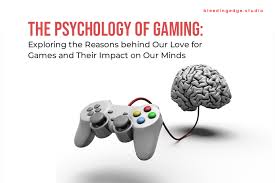The Psychology of Winning: What Video Games Teach Us About Human Behavior
Video games are more than just entertainment—they’re structured systems that tap directly into our brains. From achievement unlocks to leaderboard climbs, the design of modern games is deeply rooted in psychology. But what do these experiences reveal about the players themselves?
Why Do We Play?
At the most basic level, video games satisfy core human drives: the need for autonomy, mastery, and purpose. Whether you’re grinding to level up in a role-playing game or solving logic puzzles in an indie platformer, you’re engaging with tasks that make you feel competent and in control. That’s no small thing in a world where outcomes are often unpredictable and rewards delayed.
Games also allow for safe experimentation. You can take risks without real-world consequences, try new identities, and test the limits of what you can achieve. In competitive settings, especially, they mirror real-life psychological challenges—pressure, decision-making, focus, and even impulse control.
Risk, Reward, and Reinforcement
One of the most compelling aspects of gaming is its feedback loop. A player takes action, the game responds instantly, and that loop repeats. This dynamic keeps engagement high and is a major reason games are so effective at maintaining attention spans that might otherwise be fragmented by modern media.
This feedback mechanism is particularly prominent in game genres where anticipation and timing are everything. Take the growing trend of games that combine elements of strategy, chance, and fast-paced mechanics. Sites like gacor108 highlight this blend, offering platforms where players must balance quick decisions with a sense of risk, much like games of chance, but layered with skill-based components.
The Community Effect
It’s easy to assume that gaming is an isolating hobby, but modern research tells a different story. Online gaming communities are rich environments for social interaction, peer support, and even conflict resolution. Whether it’s cooperating in a raid or trash-talking during a match, players are constantly developing social intelligence—sometimes unknowingly.
Games also create a shared language and identity. Ask anyone who’s ever waited for a World of Warcraft guild to assemble or queued with friends for ranked play in Overwatch—the bonds formed over digital victories can be as real and lasting as those formed offline.
Lessons Beyond the Screen
Perhaps the most overlooked value of video games is how they help people learn. Studies have shown improvements in spatial awareness, multitasking, and even leadership skills among frequent gamers. Decision-making under pressure in a digital world can translate to better coping skills in real life, especially for young players who use games to explore challenges in a safe context.
Of course, moderation matters. Like any powerful system, video games can become overwhelming if not balanced with other aspects of life. But when approached with intention, they offer a rich canvas for exploration, learning, and growth.
Final Thoughts
As the medium continues to mature, video games will increasingly be recognized for the depth they offer—not just in entertainment, but in understanding ourselves. Whether you’re casually exploring open worlds or immersed in high-stakes play, each experience reveals something about how we think, adapt, and connect.
So the next time you log in, consider what the game is teaching you—not just about the rules of play, but about the rules of life.






